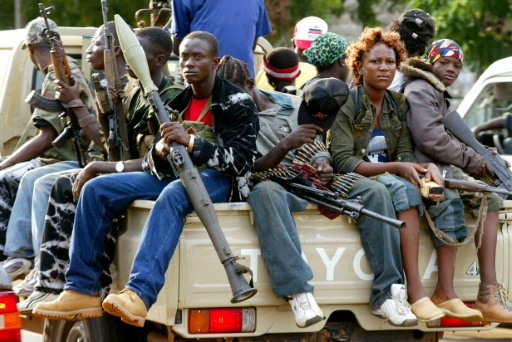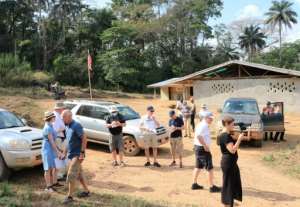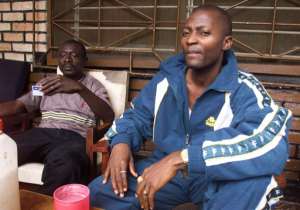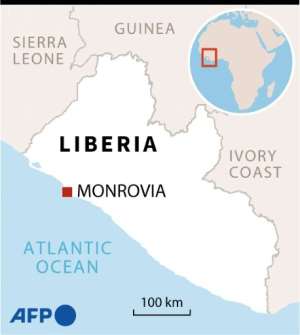
[ad_1]
Witnesses have come forward during Liberia’s first war crimes trial against former rebel Gibril Massaquoi to testify to alleged rapes and ritual killings during the country’s brutal civil war.
About a quarter of a million people were killed between 1989 and 2003 in a conflict marked by ruthless violence and rape, often perpetrated by drugged child soldiers.
Of Sierra Leonean nationality, Massaquoi was a senior commander of the Revolutionary United Front (RUF), a Sierra Leonean rebel group that also fought in Liberia.
The 51-year-old was arrested in Finland last March, where he had lived since 2008, after a human rights group investigated his war toll.
But in an unprecedented move, the Finnish court decamped to the Liberian capital Monrovia on February 23 to hear testimony in the case.
 Finnish judges participate in hearing witnesses to crimes committed during the country’s civil war. By EMMANUEL TOBEY (AFP)
Finnish judges participate in hearing witnesses to crimes committed during the country’s civil war. By EMMANUEL TOBEY (AFP) Very few people have been tried for war crimes committed in Liberia, and none inside the country itself: the Massaquoi war crimes case is the first to be held on Liberian soil.
Witnesses in recent hearings alleged that Massaquoi – whose nom de guerre was “Angel Gabriel” – was involved in murders, rapes and arson.
A 34-year-old witness told court on March 9, for example, that the RUF commander drank the blood of a victim during the unrest in Monrovia in the early 2000s.
RUF fighters captured him and several others in a central market in the city, said the witness, who is not named for security reasons.
Massaquoi then appeared and the fighters greeted him and greeted him as “Angel”.
“He asked them to bring his plate,” said the witness, referring to Massaquoi.
 Massaquoi (right), seen here when he was spokesperson for the RUF (Revolutionary United Front) in 2001. By GEORGES GOBET (AFP)
Massaquoi (right), seen here when he was spokesperson for the RUF (Revolutionary United Front) in 2001. By GEORGES GOBET (AFP) “He took the person sitting next to me, put his neck on the plate, I was very scared so I closed my eyes. His neck was cut.”
Massaquoi would have drunk the blood of the victim and would have also poured part of it on a shrine as a ritual offering.
Hearings in the case are expected to continue in Liberia for around three weeks, said Tom Laitinen, a Finnish prosecutor involved in the case.
The tribunal will then move to neighboring Sierra Leone.
Massaquoi denies any wrongdoing.
Burned alive
In another account, a 63-year-old man told the court that Massaquoi fighters captured men from his village in northern Liberia and burned them alive, although he cannot remember the exact date.
“They were trying to shoot some people but the gun did not respond because God wanted to save lives,” the witness said.
 Map of Liberia .. By Valentina BRESCHI (AFP)
Map of Liberia .. By Valentina BRESCHI (AFP) The fighters believed that a magical charm protected the villagers from bullets, he added, and therefore decided to immolate them.
“They burned about 120 people in a house,” said the witness, who added that he managed to escape into the bush.
Finnish court documents consulted by AFP detail a litany of accusations of abuse committed or ordered by Massaquoi, including murder, rape, torture, enslavement and use of child soldiers.
Former rebel Massaquoi himself provided evidence to the International Criminal Court (ICC) in 2003, for the separate civil war in neighboring Sierra Leone.
The former RUF member received legal immunity for his role in the Sierra Leone conflict in exchange for his evidence, and then moved to Finland.
But he has not received immunity for his alleged actions in Liberia, and Finnish police opened an investigation in 2018 after an investigation by rights group Civitas Maxima.
Contradictions
Massaquoi’s lawyers, however, mounted a vigorous defense.
For many of the alleged abuses in northern Liberia, Massaquoi insists he was involved in peace negotiations elsewhere in the region at the time.
And in recent hearings in Monrovia, the defense has attacked the reliability of the testimony, with most of the witnesses giving contradictory statements in court.
A witness first told Finnish police that he saw six corpses related to the case with his own eyes, for example, to admit on the stand that someone had told him about the episode.
“Is it a habit in Liberia that when someone tells you that he or she has seen something, it means that you have seen it?” said one of the defense attorneys.
Source link